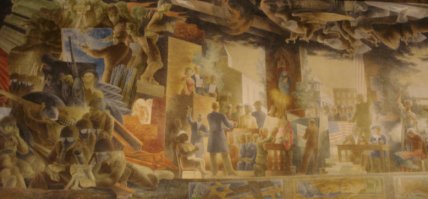I have been reading a book called Survival of the Sickest, about how seemingly deadly genetic factors can be explained. For example, genes for a potentially deadly genetic condition called hemochromatosis helped protect people from the Black Death in the middle ages.
Below is a mural at the 21st Street entrance at State Department,

A that really matters for the genes is whether or not you can reproduce, so adaptations that help you do that will be maintained even if they have downsides. This is especially true of traits that appear in later life. Throughout most of human history, people rarely lived beyond around thirty-five years old, so anything that happened after that age just didn’t matter. Usually you just had to make it into your early teens in those days to send your genes into the next generation. That explains why a lot of deadly conditions are manifest in later life. (BTW – It is not survival of the fittest with regard to being strong and good. Evolutionary fitness just means you succeed in reproducing. In this respect, the Octomom has us all beat.)
The book also goes into the interaction between genes and environment and choices. In that respect, I read a very interesting article today in NYT called “Mugged by our Genes.” It seems a lot of genetic factors are manifest more in later life. This doesn’t make much sense at first, since your body and brain are finished developing by the time you are twenty-one. What is important here is choice. Many personality traits are genetically influenced and we make choices based on these traits. A person with a risk taking personality may have chosen a lifestyle that exposes him to more dangers, so is more likely to be injured etc.
Science sure has changed since I was in school. Back then if you talked about genetics having a role in society you were shut down by your professor and labeled a racist, sexist etc. It was a generally accepted idea that people were influenced only by their environments. As I recall, when the famous and now honored geneticist Edward O Wilson came to speak at my university in the 1970s, somebody tossed a sandwich in his general direction (who knows what that meant, but it wasn’t a sign of acceptance.)
Wilson, BTW, studies insects and he observed that Marx was right that socialism works; he just has the wrong species (good for ants, not humans).
Today we understand that both genes and environment play roles and it is the combination of influences that makes us human. They influence each other to an extent that it is often impossible to separate the causality. Another interesting book I read called Nature via Nurture explained how some genes are activated by particular environments. The author talked about a particular gene the produce a propensity for violence that is activated by the experience of violence in childhood. If the kid doesn’t have the gene, violence in his youth doesn’t doom him to be a violent adult. And if he has the propensity but doesn’t experience violence as a child he will not turn violent. But in the case when the gene and violence are present, the problems come. (I read the book three year ago so I didn’t explain this perfectly. Look at the book if you are interested in the longer version. Here is an article re.)
Anyway, we have a significant ethical dilemma and it gets worse the more we can understand and predict behavior. A person may be violent through no fault of his own, but he still IS violent. It is unethical to restrict someone for crimes they have not yet committed. It is also unethical to allow someone to be hurt or killed when we have a moral certainty that it will happen.
